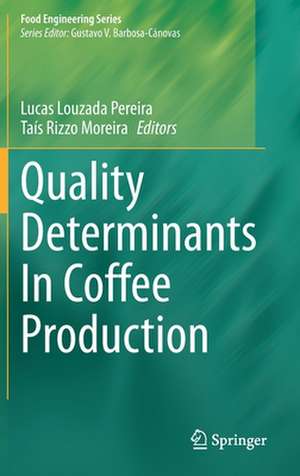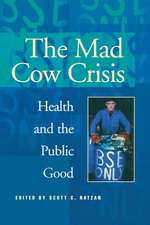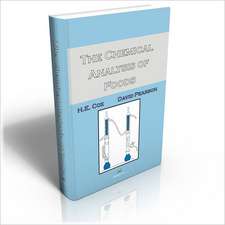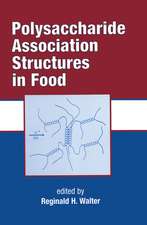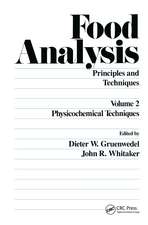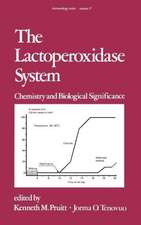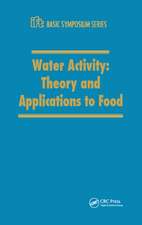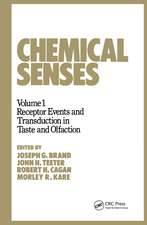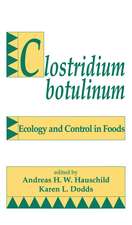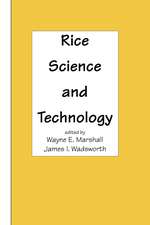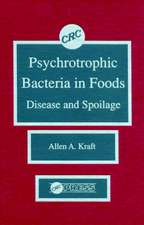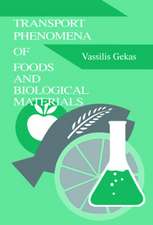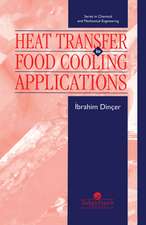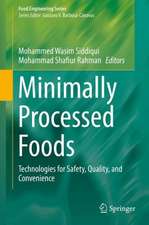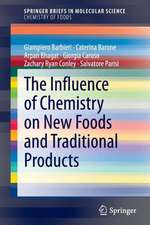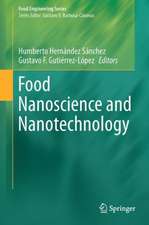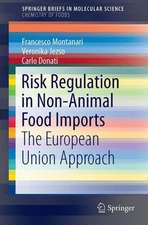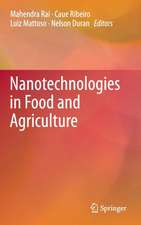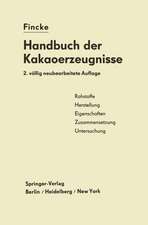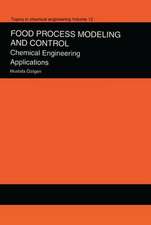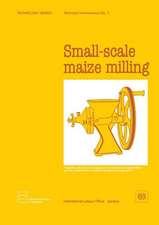Quality Determinants In Coffee Production: Food Engineering Series
Editat de Lucas Louzada Pereira, Taís Rizzo Moreiraen Limba Engleză Hardback – 12 dec 2020
The majority of the reference works published on coffee processing have a pragmatic approach covering production, harvesting, post-harvesting and marketing. This work goes beyond these subjects, covering the factors that impact quality and how they lead to either qualitative reduction or gains during processing. New technological and scientific indicators for the modification and the creation of sensory routes are extensively covered, as are the international protocols used in the sensorial analysis of coffee. With its broad approach, this text presents a multidisciplinary perspectiveconnecting areas such as statistics, biochemistry, analytical chemistry and microbiology to the results of sensory analysis using different technologies and processes. A direct relationship between these factors is established in order to help researchers understand their combined effect on coffee quality during processing.
| Toate formatele și edițiile | Preț | Express |
|---|---|---|
| Paperback (1) | 594.35 lei 6-8 săpt. | |
| Springer International Publishing – 13 dec 2021 | 594.35 lei 6-8 săpt. | |
| Hardback (1) | 905.36 lei 6-8 săpt. | |
| Springer International Publishing – 12 dec 2020 | 905.36 lei 6-8 săpt. |
Din seria Food Engineering Series
- 18%
 Preț: 980.95 lei
Preț: 980.95 lei - 15%
 Preț: 642.51 lei
Preț: 642.51 lei - 15%
 Preț: 647.92 lei
Preț: 647.92 lei - 23%
 Preț: 856.68 lei
Preț: 856.68 lei - 15%
 Preț: 647.40 lei
Preț: 647.40 lei - 15%
 Preț: 646.30 lei
Preț: 646.30 lei -
 Preț: 384.86 lei
Preț: 384.86 lei - 18%
 Preț: 966.78 lei
Preț: 966.78 lei - 18%
 Preț: 1236.38 lei
Preț: 1236.38 lei - 15%
 Preț: 656.74 lei
Preț: 656.74 lei - 15%
 Preț: 653.33 lei
Preț: 653.33 lei - 18%
 Preț: 951.59 lei
Preț: 951.59 lei - 18%
 Preț: 944.99 lei
Preț: 944.99 lei - 15%
 Preț: 716.15 lei
Preț: 716.15 lei - 18%
 Preț: 1232.57 lei
Preț: 1232.57 lei - 15%
 Preț: 647.92 lei
Preț: 647.92 lei - 15%
 Preț: 587.85 lei
Preț: 587.85 lei - 18%
 Preț: 1222.80 lei
Preț: 1222.80 lei - 18%
 Preț: 952.09 lei
Preț: 952.09 lei - 18%
 Preț: 1398.31 lei
Preț: 1398.31 lei -
 Preț: 399.12 lei
Preț: 399.12 lei - 18%
 Preț: 954.14 lei
Preț: 954.14 lei - 15%
 Preț: 644.95 lei
Preț: 644.95 lei - 18%
 Preț: 968.65 lei
Preț: 968.65 lei - 15%
 Preț: 638.89 lei
Preț: 638.89 lei - 18%
 Preț: 962.49 lei
Preț: 962.49 lei - 18%
 Preț: 1008.25 lei
Preț: 1008.25 lei - 18%
 Preț: 1225.79 lei
Preț: 1225.79 lei - 18%
 Preț: 961.41 lei
Preț: 961.41 lei - 18%
 Preț: 1378.86 lei
Preț: 1378.86 lei - 18%
 Preț: 961.72 lei
Preț: 961.72 lei -
 Preț: 489.30 lei
Preț: 489.30 lei - 18%
 Preț: 1388.05 lei
Preț: 1388.05 lei - 18%
 Preț: 1235.08 lei
Preț: 1235.08 lei - 15%
 Preț: 643.34 lei
Preț: 643.34 lei - 18%
 Preț: 2109.71 lei
Preț: 2109.71 lei - 18%
 Preț: 1815.87 lei
Preț: 1815.87 lei - 15%
 Preț: 644.95 lei
Preț: 644.95 lei - 18%
 Preț: 957.32 lei
Preț: 957.32 lei - 18%
 Preț: 973.06 lei
Preț: 973.06 lei
Preț: 905.36 lei
Preț vechi: 1104.11 lei
-18% Nou
Puncte Express: 1358
Preț estimativ în valută:
173.24€ • 181.39$ • 143.69£
173.24€ • 181.39$ • 143.69£
Carte tipărită la comandă
Livrare economică 09-23 aprilie
Preluare comenzi: 021 569.72.76
Specificații
ISBN-13: 9783030544362
ISBN-10: 3030544362
Ilustrații: XVII, 443 p. 172 illus. in color.
Dimensiuni: 155 x 235 mm
Greutate: 0.86 kg
Ediția:1st ed. 2021
Editura: Springer International Publishing
Colecția Springer
Seria Food Engineering Series
Locul publicării:Cham, Switzerland
ISBN-10: 3030544362
Ilustrații: XVII, 443 p. 172 illus. in color.
Dimensiuni: 155 x 235 mm
Greutate: 0.86 kg
Ediția:1st ed. 2021
Editura: Springer International Publishing
Colecția Springer
Seria Food Engineering Series
Locul publicării:Cham, Switzerland
Cuprins
Part One: History of sensorial analysis and quality determination in coffee production: evolution and techniques
Part Two: Sensorial techniques and tools used in coffee production
Part Three: The relationship between fruit microbiology and coffee quality: climatic factors and sensorial analysis
Part Four: Biotechnological processes in coffee production: applicability of induced and spontaneous routes from the manipulation of raw material
Part Five: Volatile coffee compounds and gas chromatography techniques
Notă biografică
Lucas Louzada Pereira is a Professor and coordinator of the Laboratory for Analysis and Research in Coffee - LAPC - at the Federal Institute of Espírito Santo.
Taís Rizzo Moreira is currently a PhD student in the Postgraduate Program in Forest Sciences at the Center for Agricultural Sciences and Engineering in the Federal University of Espírito Santo, conducting research on the climate influence on coffee production in Brazil.
Taís Rizzo Moreira is currently a PhD student in the Postgraduate Program in Forest Sciences at the Center for Agricultural Sciences and Engineering in the Federal University of Espírito Santo, conducting research on the climate influence on coffee production in Brazil.
Textul de pe ultima copertă
Quality Determinants In Coffee Production presents a comprehensive overview of the main determinants of coffee quality during processing. Authored by members of the Laboratory for Analysis and Research in Coffee at the Federal Institute of Espírito Santo, the chapters in this text explain how coffee quality can be affected through each step of the main processing methods. The first section explores the history of coffee processing, covering how the processes and techniques of sensorial analysis have developed. The second section covers the evolution of these techniques and how various complexities can affect their use, plus the statistical tools that are used to increase test accuracy. Another section focuses on the relationship between fruit microbiology and coffee quality, promoting an understanding of how yeasts, fungi and bacteria effect the quality of coffee during processing. Another section is dedicated to the biotechnological processes used in coffee production, including the applicability of induced and spontaneous routes from the manipulation of raw material, the relationship between wet processing and spontaneous fermentation and the construction of sensorial routes. A final section explores volatile coffee compounds and gas chromatography techniques, including chemical and sensory maps.
The majority of the reference works published on coffee processing have a pragmatic approach covering production, harvesting, post-harvesting and marketing. This work goes beyond these subjects, covering the factors that impact quality and how they lead to either qualitative reduction or gains during processing. New technological and scientific indicators for the modification and the creation of sensory routes are extensively covered, as are the international protocols used in the sensorial analysis of coffee. With its broad approach, this text presents a multidisciplinary perspectiveconnecting areas such as statistics, biochemistry, analytical chemistry and microbiology to the results of sensory analysis using different technologies and processes. A direct relationship between these factors is established in order to help researchers understand their combined effect on coffee quality during processing.
The majority of the reference works published on coffee processing have a pragmatic approach covering production, harvesting, post-harvesting and marketing. This work goes beyond these subjects, covering the factors that impact quality and how they lead to either qualitative reduction or gains during processing. New technological and scientific indicators for the modification and the creation of sensory routes are extensively covered, as are the international protocols used in the sensorial analysis of coffee. With its broad approach, this text presents a multidisciplinary perspectiveconnecting areas such as statistics, biochemistry, analytical chemistry and microbiology to the results of sensory analysis using different technologies and processes. A direct relationship between these factors is established in order to help researchers understand their combined effect on coffee quality during processing.
Caracteristici
Provides a comprehensive overview of the main determinants of coffee quality during processing, promoting an understanding of their combined effect on coffee quality Presents a multidisciplinary perspective connecting areas such as statistics, biochemistry, analytical chemistry and microbiology to the results of coffee sensory analysis using different technologies and processes Covers the evolution of sensorial techniques used in coffee processing and how various complexities can affect their use, plus the statistical tools that are used in studies on sensory analysis to increase test accuracy
